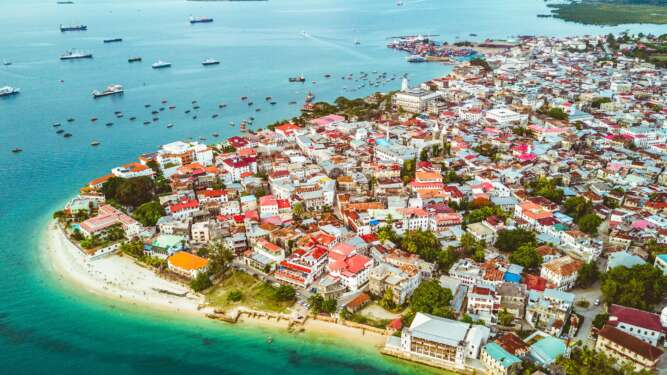The Tanzanian central bank (Bank of Tanzania – BoT) published a detailed economic bulletin for the quarter ending September 2020, which showed Zanzibar’s economy taking a nosedive contracting by 2 per cent compared to a growth rate of 5.2 per cent in the corresponding quarter in 2019.
Zanzibar—the semi-autonomous region of Tanzania, is taking various measures to enhance economic and trade liberalization that can pave a smooth way for the private sector to get engaged in the local, regional and international arena.
On a cross-examination basis, as a result of the island’s efforts to get its economy amalgamated into the big table, in 2019, Zanzibar’s GDP grew by 7 per cent of which the industrial sector contributed 18.3 per cent, according to a publication by Zanzibar Invest.
“Agriculture and service sectors contributed 21.2 per cent and 50.6 per cent respectively. While the GDP contribution of 6.8 per cent by the manufacturing subsector is still low, it is expected to grow given the economic reforms being undertaken. This is evidenced by the annual growth rate of 7 per cent that the subsector has experienced over the last three years (from 2017),” according to Zanzibar Invest.
Unlike mainland Tanzania, where the economy was at least forecasted to grow by 5.5 per cent despite the coronavirus shocks, Zanzibar’s economic activities slowed down, including the accommodation and food services, transport, and information and communications sectors.
The report painted the gloomy picture that accommodation and food services—which are directly connected to tourism—contracted by 14.1 per cent, compared to a growth of 11.6 per cent in the quarter ending March 2019.
Furthermore, the hospitality industry’s contribution to real output in the Zanzibar economy declined by 8.2 per cent from 1.4 per cent.
The report also noted that during the quarter ending September 2020, the economy was expected to pick up gradually as the impact of COVID-19 was wearing off, following the smooth transition from lockdown measures initiated by the island’s trade counterparts.
The pandemic brought anticipated slowdown to both, Tanzania and Zanzibar, the latter experiencing intense shock particularly to the hospitality industry, which saw less passenger flights due to lockdowns.
READ:Bank of Tanzania notices Zanzibar’s economic growth
However, the headline inflation eased to an average of 2.7 per cent from 4.5 per cent in the second quarter; this is argued by the report that it is associated with a fall in prices of non-food items particularly cement and petroleum products, but it rose when compared to the same period in 2019.
On the other hand, two activities contributed positively to the real GDP in the second quarter of 2020 according to the central bank report. These were wholesale and retail trade (1.5 per cent) and manufacturing (1.0 per cent).
The second quarter was also marked by a slowdown in the procurement of cloves, one of Zanzibar’s dependable crops, which the report argued was due to low production.
Only 160.5 tonnes of cloves were procured during the quarter which was lower than 561.2 tonnes procured in the same quarter in 2019.
While 1,517.2 tonnes of seaweed was procured, this was higher than the 1,172 tonnes which were procured in the corresponding period in 2019.
On the tourism landscape, the performance was low as the virus pandemic limited movement over space, particularly in the majority of countries where tourists originate from: Italy, United Kingdom, United States, Germany and France. The number of visitors dropped to 12,867 from 174,057 recorded during the same quarter in 2019.
READ:Coronavirus Africa update: Zanzibar permits tourism, under strict conditions
However, on the debt side, the quarter ending September 2020 saw new borrowing events that led to an increase in debt stock for Zanzibar amounting nearly to $369 million from about $345 million recorded at the end of the corresponding quarter in 2019.
“The increase was largely explained by new borrowing,” the reported argued.
Further, debt owed to multilateral institutions and bilateral sources was nearly 89.6 per cent of the total debt.
The domestic debt stock rose to $76 million in the quarter ending September 2020, rising by 26.2 per cent from the level registered at the end of the same quarter in 2019; as a result of new loans. For the exports sector, the value of goods and services exported marked $40.1 million, a decline of 36.5 per cent from the amount recorded over the same quarter in 2019.
The value of goods and exports amounted to $2.7 million, a downturn from $43.6 million in the quarter ending September 2019, which the report indicated was a result of the low exports of cloves and seaweeds being a factor.
On imports of goods and services, the value of imports clocked in at $123.8 million, 22.5 per cent higher than the value recorded over the same period in 2019.
“The increase was mainly driven by imports of capital goods—mainly machinery, and building and construction materials,” the report argued.
Zanzibar has reopened its economy-wide for the world, hence—with the election of the current president Hussein Mwinyi, who vowed to transform the strategic sectors, there is more to expect from the island.
READ:Zanzibar elects Dr. Hussein Ali Mwinyi as its 8th president
